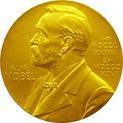
The Nobel Prizes represent an exclusive club of exceptional individuals whose work have greatly benefitted mankind.
One of its six categories is the Physiology or Medicine prize which this year was awarded to Yoshinori Ohsumi from the Tokyo Institute of Technology for discoveries of the mechanisms of autophagy. Autophagy can be simply translated as 'self-eating' where cells degrade then reuse its components, sort of like a cellular recycling service.
We didn't understand it until Dr. Ohsumi's remarkable experiments with yeast cells revealed the genes involved in autophagy. His work allowed other scientists to find a similar process in human cells. Without this re-cycling process, our cells could not function and life itself would be compromised.
This year's Nobel Prize in Chemistry is shared by three scientists, Jean-Pierre Sauvage at the University of Strasbourg, J. Fraser Stoddart, from Northwestern University, and Bernard L. Feringa of the University of Groningen. They were rewarded for their design and synthesis of machines made from molecules.
Dr. Sauvage developed interlocking ring shaped molecules that allowed one ring to rotate freely, sort of like an axle and wheel. Dr. Stoddart expanded on this and produced molecular versions of an elevator and a muscle. And Dr. Feringa had been producing molecules that never existed before, such as a molecular motor whose wheels rotate at 12 million revolutions per second. This revolutionary technology is comparable to the arrival of the first electric motor in the 1830s.
We celebrate these 2016 Nobel winners!
More Information
The Official Web Site of the Nobel Prize
Everything you ever wanted to know about the Nobel Prizes
Three scientists who created nano-sized machines win Nobel Prize in chemistry
Jean-Pierre Sauvage, Sir J. Fraser Stoddart and Bernard L. Feringa figured out how to combine atoms to make nanoscale machines that can act like motors, elevators, muscles and even a rudimentary car with four 'wheels.' Their creations are so small that they're about 1,000 times more narrow than a human hair...
Yoshinori Ohsumi wins Nobel prize in medicine for work on autophagy
Japanese cell biologist is named 2016 laureate for his discoveries on how the body's cells break down and recycle their own components...